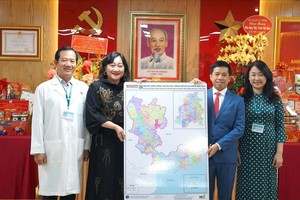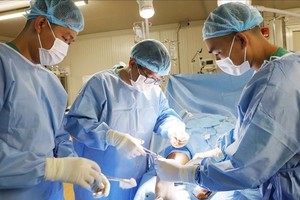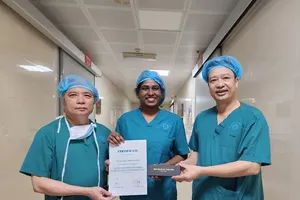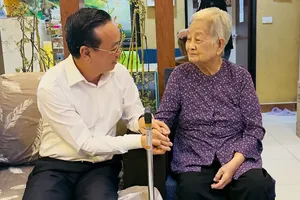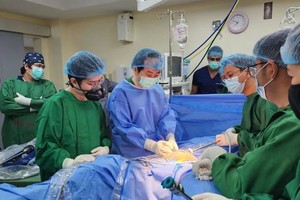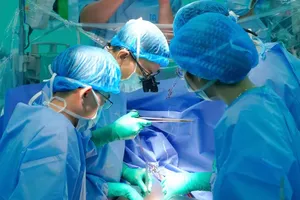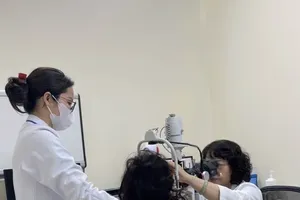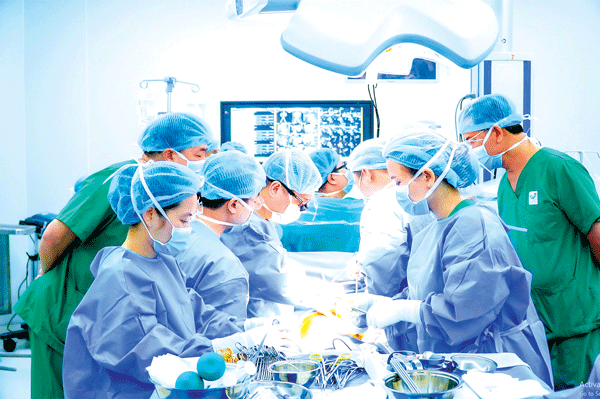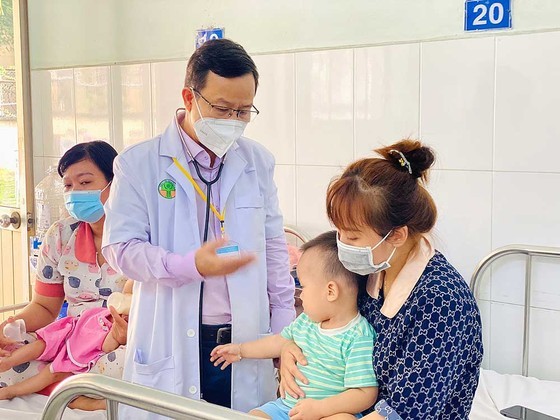 A doctor of Children Hospital No.2 is examining a child
A doctor of Children Hospital No.2 is examining a child
The weather condition in the southern region is changing - a favorable condition for the development of viruses and bacteria, increasing the incidence of diseases, especially when students officially enter the new school year.
Dr. Nguyen advised parents need to combine many measures to protect and prevent infection from both inside and outside to avoid cross-infection and ensure children’s health condition when the new academic year is going to start.
From August 25, a mother of two children in An Phu Ward in Thu Duc City has had to constantly go in and out of the Ho Chi Minh City-based Children's Hospital No.2’s Department of Gastroenterology to take care of her two children with intestinal infections.
She remembered that an hour after the two children ate a loaf of bread bought at a store near her house, they both experienced signs of abdominal pain and vomiting. Suspicious that the child had food poisoning, she took her child to Le Van Thinh Hospital for first aid.
Doctors diagnosed the children with intussusception and transferred them to Children's Hospital for emergency treatment. She moaned because the children are still experiencing fever and sweaty, doctors said they both must stay in the hospital until they are in stable condition.
Similarly, a mother in Tan Phu District and her 9-year-old son are being isolated at the Covid-19 Department in Children's Hospital No.1 because her child had both Covid-19 and gastrointestinal disease. She was worried because her child constantly had a fever.
Before that, she and her son had a sore throat and fever. Test results for the SARS-CoV-2 virus showed that both mother and child were positive for Covid-19, so they had to be isolated and monitored at home. A few days later, her child had a fever, diarrhea, and convulsions, so they were rushed to the hospital for treatment.
Dr. Ha Van Thieu, Acting Head of Gastroenterology Department in Children's Hospital No.2, said that recently, the number of children hospitalized for acute viral gastroenteritis and food poisoning tends to increase. In particular, the number of acute gastroenteritis cases increased over the same period last year, accounting for 25 percent-40 percent of the total number of hospital admissions. In addition, every day, the hospital receives from 3-10 pediatric patients in a state of the stomach and duodenal ulcers leading to gastrointestinal bleeding. Worse, some people even vomited blood and were fatigued. Currently, the number of children with gastrointestinal bleeding, waiting for endoscopy is over 20 cases.
Infirmaries in districts and Thu Duc City also recorded a 20 percent increase in many children with dengue fever, hand, foot and mouth disease, seasonal flu, and Japanese encephalitis since August 22 when students in the southern largest city returned to schools. Dr. Vo Thanh Hung, Head of the Department of Infectious Diseases of Le Van Thinh Hospital, informed that on weekdays, there were about 15-30 times of children visiting the infectious diseases clinic and the Pediatric Department with respiratory and digestive symptoms.
When a child has signs such as vomiting, diarrhea, dehydration, and especially fever accompanied by severe dehydration, parents or adults should give them warm water with oresol solution. If a child shows symptoms such as not being able to drink, bloody diarrhea, vomiting many times, excitement, struggling, not playing, lethargy or crying without tears, and dry lips, parents need to quickly take their child to a medical facility for treatment.
Besides, Dr. Nguyen Tran Nam, Deputy Director of Ho Chi Minh City Children's Hospital, said that, in addition to Covid-19, and dengue fever, parents need to be wary of Japanese encephalitis because this disease often occurs from May to October every year. The pathological symptoms of this disease are easy for parents to mistake for fever; and in the learning environment, children are susceptible to infection.
Epidemiologists also recommend keeping schools, classrooms, and personal hygiene - a very important condition to help prevent disease. Children's boarding areas must be cleaned and dishes and chopsticks are dried and tables and chairs must be washed with chemicals.

